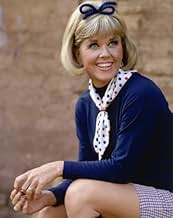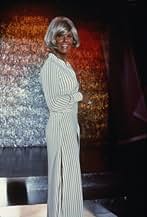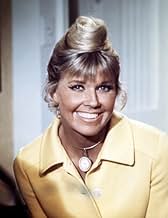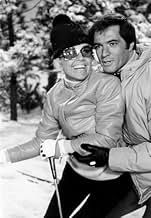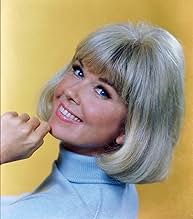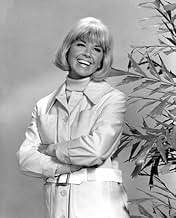Tras pasar la mayor parte de su vida en las grandes ciudades, la viuda Doris Martin decide volver al rancho familiar.Tras pasar la mayor parte de su vida en las grandes ciudades, la viuda Doris Martin decide volver al rancho familiar.Tras pasar la mayor parte de su vida en las grandes ciudades, la viuda Doris Martin decide volver al rancho familiar.
- Premios
- 2 nominaciones en total
Explorar episodios
Opiniones destacadas
I don't think this generation realizes how successful an actress and singer Doris Day was in the 50s and 60s (for starters). She starred in movies with some of the greatest leading men of the day. She was a talented jazz singer. She was a fashion icon. She seemed to have no 'dark side' or addictions. And then she had this television series.
From what I've read in scattered reviews of books about her, she didn't want to be a television actress. However, the ineptitude of her husband's managing her career put her so deep in debt that she had to perform in a television series because he had signed a contract obligating her to do so. Such is the danger of power of attorney!
Scriptwriters veered toward the sickeningly sweet dialogue and plots sometimes. When I watched the old 'Doris Day Show,' season 1, there was not much of that defect in the stories. Later, I think the writers fell into bad habits, but early on, Doris just seems to play Doris. That person is just a really nice person, one you love and want to know.
I enjoy seeing these old episodes of Season 1. Doris loves her animals and she loves her family! You would think these themes would be enough. Less talented writers forgot these important things but for a while, the series had the actress coming through as a very natural self, with high aspirations for her parenting role and a commitment to live on the ranch with her family. Nostalgic? Yes. But it's that lovely nostalgia that doesn't prompt you to laugh but instead miss all those 'family values' that used to rule television.
From what I've read in scattered reviews of books about her, she didn't want to be a television actress. However, the ineptitude of her husband's managing her career put her so deep in debt that she had to perform in a television series because he had signed a contract obligating her to do so. Such is the danger of power of attorney!
Scriptwriters veered toward the sickeningly sweet dialogue and plots sometimes. When I watched the old 'Doris Day Show,' season 1, there was not much of that defect in the stories. Later, I think the writers fell into bad habits, but early on, Doris just seems to play Doris. That person is just a really nice person, one you love and want to know.
I enjoy seeing these old episodes of Season 1. Doris loves her animals and she loves her family! You would think these themes would be enough. Less talented writers forgot these important things but for a while, the series had the actress coming through as a very natural self, with high aspirations for her parenting role and a commitment to live on the ranch with her family. Nostalgic? Yes. But it's that lovely nostalgia that doesn't prompt you to laugh but instead miss all those 'family values' that used to rule television.
Doris Day, the number one female box-office attraction of all-time, smoothly segued into television in September of 1968. Although she had not planned to do a series, her late husband Marty Melcher had committed her to a deal with the eye network and as Day always said, "...a deal is a deal..." Despite stellar ratings the first week, the series faltered somewhat during the following weeks as viewers became frustrated at seeing Doris, who had achieved tremendous cinema success as a working, strong-minded woman, relegated to living on a farm. She was a delight as a widow with two young sons, a father, farm hand and housekeeper, but the scripts gave her little to do but smile. She took control of the show during the second season, had her character, Doris Martin get a job at a magazine in San Francisco, and ratings shot through the roof. The second through fifth seasons were certainly notable for many reasons. "The Doris Day Show" averaged 35-35 million viewers each Monday evening. It was largely due to Day's tremendous likeability and effortless skill as an actress and comic. The situations, while often uproariously funny, were never so slapstick that they bordered on caricature. She wisely surrounded herself with a wonderful supporting cast and guest stars that complimented her inherent skills. Maclean Stevenson, Rose Marie, Kaye Ballard, Bernie Kopell, Billy DeWolfe and others, were all given ample opportunity to shine, Day never feeling she wanted all the focus to be on her. There were wonderful guest stars and a look-see at the series will give you a chance to watch a young Jodie Foster and a venerable Estelle Winwood, well into her 80's at the time she appeared on the series several times. Henry Fonda, Day's "Midnight Lace" co-star John Gavin, Lew Ayres, Tony Bennett, Peter Lawford, and Patrick O'Neal are just a handful of those who graced the tube with the freckle-faced dynamo. Continuing her big-screen role as an independent woman who wouldn't take flack from anyone, instead building a successful career in what was often a man's world, prior to the so-called cutting edge "Mary Tyler Moore Show", Day was a woman of strength and determination although never submerging her femininity and becoming hard or cold. Occassionally Doris Day even let lose with a song or two, harmonizing with Bennett to "I Left My Heart in San Francisco", chirping with Larry Storch to "Harvest Moon" or singing a perfectly beautiful "Silver Bells" during a Christmas episode. Always garbed beautifully, Day had a great time sending up her own image as in an episode where her character, Doris Martin, won a Doris Day look-alike contest. While the show underwent some changes of cast and locale each season, her character continued her job at Today's World, and always maintained her integrity and sense of humor. In the Spring of 1973, following a successful five year run of almost 130 episodes, Day decided not to renew her contract for another season feeling that she had done what she could with the role. Offers continued to pour in for various series but Day felt the series stood on its own merits. A look at the show today shows that she was savvy in walking away when she did. It remains funny, charming, very watchable, and Day remains a surefire treat, the glue that keeps everything nicely together.
This show ran from 1968 until 1973, and I hadn't seen it on TV probably since its initial run until the DVDs came out. The show aired at a time when American culture was going through a great transition. When Doris Day first went on the air Bonanza and The Andy Griffith Show were the top television draws. By the time it went off the air it was All in the Family and M.A.S.H. Thus it is amazing that Doris Day stayed on the air for five years during this time when her clean-cut image probably set her apart from the crowd, and then walked away from her show - the show was not canceled due to poor ratings. In fact, it did quite well throughout its run.
It will take you back to a simpler time, but then so did Doris Day's films and I still find those enjoyable. The show did make major changes to accommodate the changing times. Initially it had a rural setting with Doris being a widow with two sons who played a major part in the show. First the show had her moving to San Francisco. Next she and her sons moved to a more "hip" apartment. By season four the kids and her widowhood status had disappeared and she was single. Her father and her sons just vanished into thin air, never to be mentioned again.
Also, Doris evolved from a secretary to an associate editor. However, she kept her name and the second apartment she had when her sons had existed. It was very confusing. I'd still recommend it, just remember that culture changed so fast in the U.S. during this time that it even had an effect on how Doris Day was presented.
It will take you back to a simpler time, but then so did Doris Day's films and I still find those enjoyable. The show did make major changes to accommodate the changing times. Initially it had a rural setting with Doris being a widow with two sons who played a major part in the show. First the show had her moving to San Francisco. Next she and her sons moved to a more "hip" apartment. By season four the kids and her widowhood status had disappeared and she was single. Her father and her sons just vanished into thin air, never to be mentioned again.
Also, Doris evolved from a secretary to an associate editor. However, she kept her name and the second apartment she had when her sons had existed. It was very confusing. I'd still recommend it, just remember that culture changed so fast in the U.S. during this time that it even had an effect on how Doris Day was presented.
How this show lasted five years is amazing considering each year the show was about something else. Her trademark theme song said it each week: 'What ever will be will be!' The show aired between 1968 and 1973, a time when women's roles changed in society and on television. "The Doris Day Show" reflected these changes beginning with Doris as a "modern housewife:" a widowed mother of two living in the country, and evolved into a pre-Mary Richards role model for single women in the work place (the first ever on television!) Because each year brought a different look (and different cast) to the show, it is difficult to sell in syndication but perhaps Nick-at-Night which prides itself in the evolution of such shows will have fun with it some day. (My suggestion: Do one of those five nights a week summers where Monday has the first year, Tuesday has the second year, and so forth...each year really was an entity unto itself.) The bottom line is that it features America's sweetheart Doris Day and that's really all that it needed. What ever will be will be.
You all know the backdrop of this series so I won't bore you with it. I love this show and I too like the season 2 and 3 shows the best. As far as format changes go, I think they did a really good job going from season 1 to 2 to 3. It was a logical progression, Doris gets a job, then she moves the family into town etc. I hate the way they changed the format in season 4 and 5. Had I been around at that time to put my two cents in I would have done several things. 1. In season 4 I would have left things exactly as they were in season three and brought in the Peter Lawford character as Doris's serious love interest and possible step father for the boys. This along with the normal goings on would have brought yet another logical advancement. 2. In season 5 I would have Doris and Peter get engaged, Doris gets a new Boss and is promoted to a staff writer position at the magazine. The season finale would have been Doris and Peter's wedding with the entire cast from all the seasons in attendance. This could have been a huge ratings getter and a great way to end the series. I just don't know what they were thinking when they did 4 and 5. There are some episodes that are good but the show is missing the heart it had in 1,2, and 3. As was stated by another poster we cant go back and change history but thankfully there is enough good in seasons 1 2 and 3 that I watch them all the time. A must for Doris Fans.
¿Sabías que…?
- TriviaDoris Day's contract with CBS to do this series set a record, with her production company getting several million dollars in up-front money. It was negotiated by Martin Melcher, her husband of 17 years. However, after Melcher died unexpectedly in April of 1968, just five months before the series was to debut, Day said she had no knowledge of ever having signed on to do the show. It turned out that Melcher and the couple's lawyer and financial advisor had squandered the millions of dollars that Day had made in her 20-year career in films and records, leaving her not only flat broke but also more than $500,000 in debt. Melcher, desperate for money, had used his position as her husband and manager and had contracted with CBS to produce a sitcom for Day, but he never told her about it.
- ConexionesFeatured in Biography: Doris Day: It's Magic (1998)
Selecciones populares
Inicia sesión para calificar y agrega a la lista de videos para obtener recomendaciones personalizadas
- How many seasons does The Doris Day Show have?Con tecnología de Alexa
Detalles
- Fecha de lanzamiento
- País de origen
- Idioma
- También se conoce como
- El show de Doris Day
- Locaciones de filmación
- 650 California Street, San Francisco, California, Estados Unidos(Today's World magazine office)
- Productora
- Ver más créditos de la compañía en IMDbPro
Contribuir a esta página
Sugiere una edición o agrega el contenido que falta

